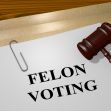In 2018, Florida voted by a significant majority to allow convicted felons to vote once their sentence was completed. The law went into effect, but with restrictions on the voting rights of Floridian felons. The new law states that felons may vote, but only once they have paid all fines and fees owed to the state as a result of their conviction.
After the law faced challenges from some of the state’s convicted felons and voting rights groups, the restrictions were struck down by the federal district court. Later, the appellate court stalled the voting rights of felons until that court could hear the matter.
The state’s primary happens to coincide with the date of the hearing, making it impossible for felons to vote in that election. The
flip-flop prompted attorneys to take the matter to the Supreme Court, but the highest court of the land chose not to interfere. The right of felons to cast their votes in the critical swing-state is still uncertain, even as the November election rapidly approaches.
Felon Voting Rights
Limitations on the right of convicted felons to vote are not unique to Florida. Almost all states have some form of restriction in place to limit voting rights for those who are convicted of felony offenses. Maine and Vermont remain the only jurisdictions in which felons can vote, even during periods of incarceration.
Sixteen states prevent felons from voting until the day of their release. In these states, as well as the District of Columbia, the right to vote automatically returns to the felon on the day of his or her release.
Another 21 states restrict the right to vote for the duration of incarceration and during any probationary or parole period. In some of these jurisdictions, the felon may also be required to pay certain restitution or fines before their voting rights are returned.
In eleven states, felons face extreme difficulty in regaining their right to vote. These states may permanently revoke the rights of felons to vote or force them to overcome significant hurdles, including obtaining a governor’s pardon, if they wish to regain their ability to cast a ballot.
Florida Amends Its Constitution
In 2018, Florida, which had some of the strictest rules regarding felon voting rights, amended its constitution to restore voting rights to felons other than those convicted of felony sexual offenses or murder. The law, titled SB 7066, required that the felons complete their sentences and pay off any fees, fines, or restitution owed as a result of their conviction and incarceration.
Advocates for voting rights attacked the monetary restrictions as being unconstitutional and filed a lawsuit against the state. A US district court judge sided with the voting rights advocates, describing the restrictions as unjustly requiring felons to pay to vote. The judge stated that such restrictions could not apply to those felons who are genuinely not financially able to cover the fees that they owe. The state appealed, and the Eleventh Circuit temporarily blocked the district court’s ruling. The appellate court of the Eleventh Circuit will hear the case on August 18th. Florida’s primary election also happens to fall on August 18th, guaranteeing that anyone who is waiting for the ruling to learn whether he or she can vote will be unable to participate in the primary.
The voting rights groups involved in the case sought an appearance before the Supreme Court, claiming that the system is effectively a poll tax and that the appellate court improperly overturned the lower court’s ruling before its hearing. The 24th Amendment of the United States Constitution prohibits poll taxes, and if the law is determined to qualify as a tax, it will be deemed unconstitutional.
Felons’ Fines and Fees as a Roadblock to the Polls
The groups fighting against the requirement to pay fines and fees point out that the majority of felons are unable to afford these payments, meaning that they will be prevented from participating in elections. Given that about two-thirds of voters supported restoring the right to vote to Florida’s felons, this impediment is being portrayed as against the wishes of the majority of the public. The result of the requirement to pay fees will likely lead to about one million people not being able to vote in November.
Another issue is that even felons who have the funds to cover the fines and fees are unable to easily access the amount that they owe. Many felons do not receive the information regarding their debt until years after they are released from prison. Such a law, therefore, effectively prevents felons from completing the steps needed to regain their right to vote even if they are able and willing to comply with the requirements.
Florida is arguing that the fees are a part of the sentence and that until a felon pays, he or she has not completed his or her sentence as required by law. According to Florida, the fact that many felons are financially incapable of settling such debts does not prevent the state from withholding those individuals’ right to cast a vote. In other words, the inability to pay does not excuse an individual from complying with the financial provision of his or her sentence, and the law requires the completion of the sentence in order to restore the right to vote.
The Supreme Court Will Not Interfere
The Supreme Court chose not to hear the plaintiff’s challenge to the stay order, a decision that keeps the fee requirements in place for the time being and will prevent many felons from participating in the 2020 Florida primary.
A dissenting opinion penned by Justice Sonia Sotomayor and signed by justices Elena Kagan and Ruth Bader Ginsberg states that the Eleventh Circuit’s decision to stay the order, without explanation, just before an election is erroneous. By not overruling the decision, the three justices argued that the Court is “condoning disenfranchisement.”
It is highly likely that once the Eleventh Circuit makes a ruling on the case, the issue will be brought to the Supreme Court.






